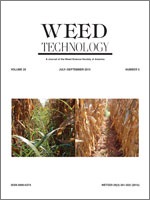Biochar and vinasse are by-products of biofuel production that can be used as soil amendments. However, their addition to the soil might affect PRE herbicide activity. Although studies have shown that biochar has a high herbicide adsorption capacity, there is little information available about biochar effect on weed control especially under field conditions. Therefore, the objective of this study was to determine the influence of biochar and vinasse application on atrazine and pendimethalin availability and herbicide activity under in vitro and field conditions. In vitro atrazine and pendimethalin herbicidal activities were not influenced by vinasse addition, but biochar application reduced atrazine and pendimethalin injury for all evaluated species. A sorption experiment confirmed high affinity of biochar for atrazine and pendimethalin. Linear regression analysis showed that the slope for atrazine and pendimethalin adsorption was 16 and 4 times higher in soil with biochar than in soil alone. Under field conditions, biochar at 0.5 kg m−2 reduced atrazine and pendimethalin weed control 75% and 60%, respectively. These results suggested that the use of biochar as a soil amendment in cropping system could decrease PRE herbicide efficacy. Therefore, mitigating practices such as the use of higher rates or reliance on POST herbicides and cultivation might be necessary to ensure proper weed control.
Nomenclature: Atrazine; pendimethalin; biochar; vinasse.
El biochar y la vinaza son subproductos de la producción de biocombustibles que pueden ser usados como enmiendas de suelo. Sin embargo, su adición al suelo podría afectar la actividad de herbicidas PRE. Aunque estudios han mostrado que el biochar tiene una alta capacidad de adsorción de herbicidas, hay poca información disponible acerca del efecto del biochar sobre el control de malezas, especialmente bajo condiciones de campo. Por esta razón, el objetivo de este estudio fue determinar la influencia de la aplicación de biochar y de vinaza sobre la disponibilidad y actividad herbicida de atrazine y pendimethalin in vitro y en condiciones de campo. In vitro, la actividad herbicida de atrazine y pendimethalin no fue influenciada por la adición de vinaza, pero la aplicación de biochar redujo el daño causado por atrazine y pendimethalin en todas las especies evaluadas. Un experimento de sorción confirmó la alta afinidad del biochar por atrazine y pendimethalin. Análisis de regresión lineal mostraron que las pendientes de las curvas de adsorción de atrazine y pendimethalin fueron 16 y 4 veces mayores en suelo con biochar que en suelo solo. Bajo condiciones de campo, el biochar a 0.5 kg m−2 redujo el control de malezas de atrazine y pendimethalin en 75% y 60%, respectivamente. Estos resultados sugirieron que el uso de biochar como enmienda de suelo en sistemas de cultivos podría disminuir la eficacia de herbicidas PRE. Por esto, prácticas de mitigación tales como el uso de mayores dosis o una mayor dependencia en herbicidas POST y labranza podrían ser necesarios para asegurar un control adecuado de malezas.






